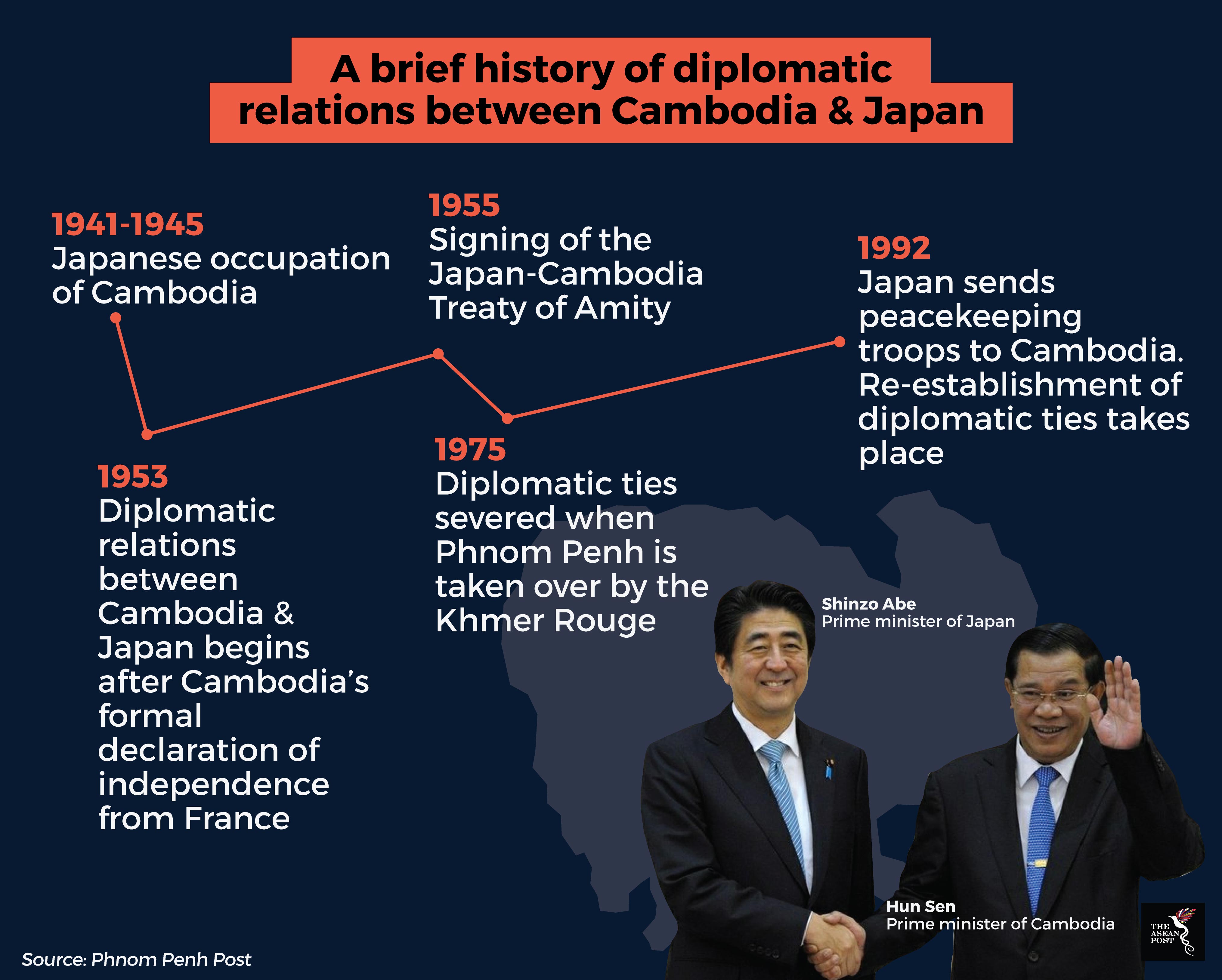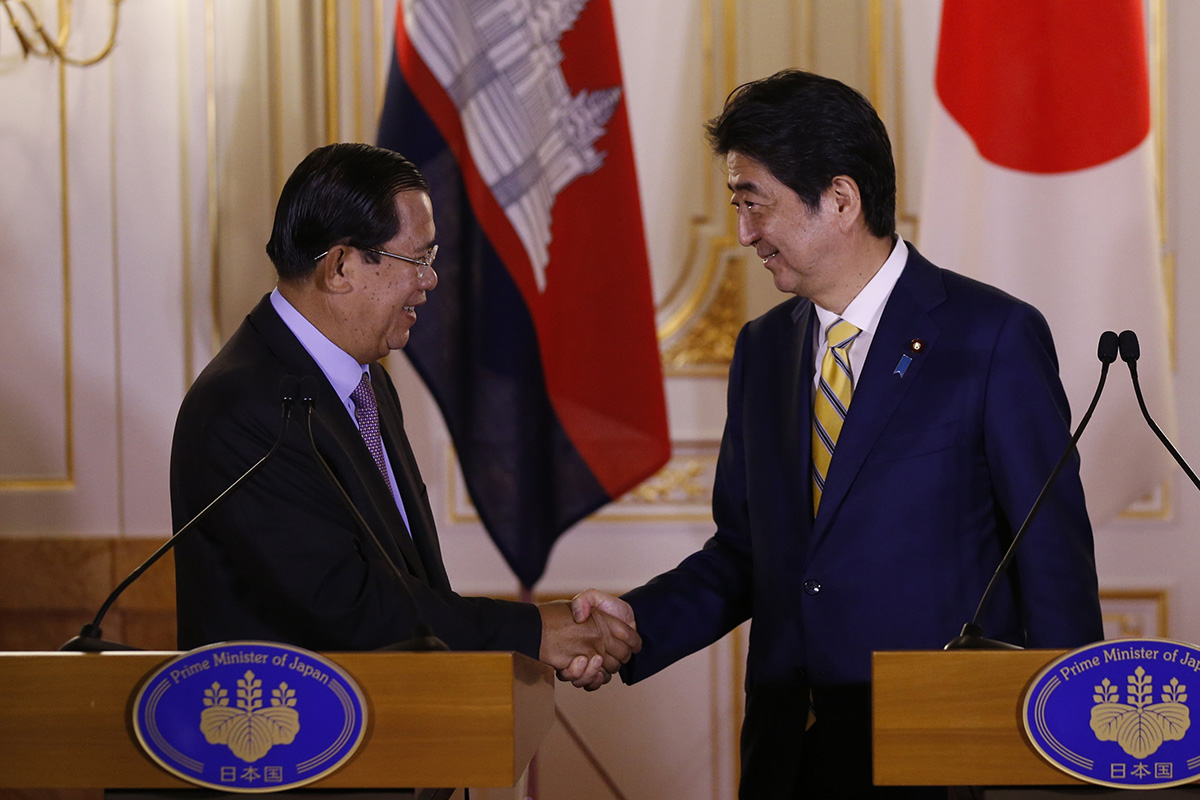This year, Cambodia and Japan will celebrate 65 years of diplomatic ties. According to Hidehisa Horinouchi, Japanese ambassador to Cambodia, both countries will commemorate the occasion by holding a number of exchange events in Cambodia, such as an annual music festival featuring all kinds of music genres, as well as a few educational and cultural events showcasing Japanese culture in Cambodia.
Both countries clearly see the need for strong relations in the midst of an evolving geopolitical landscape. Cambodia needs Japan’s’ economic support to sustain strong levels of economic growth, for one. Its economic growth has been sustained at an average rate of 7.6% from 1994 to 2015, and is projected to hit around 6.9% according to World Bank analysis. Health and education remain key development areas for Cambodia, the World Bank noted in October 2017.
Japan has not disappointed. It currently accounts for 20% of Cambodia’s total official development assistance (ODA) receipts according to reporting by the Khmer Times in February 2018, and is set to provide a further US$168 million in ODA this year, in an effort to fast-track the implementation of a number of high-priority projects. Most of Japan’s ODA funds have gone to the development of Cambodia’s infrastructure, social services, health and education and human resources, according to data from the embassy of Japan in Cambodia. Most recently, in February 2018, the Japanese government provided grant assistance of up to US$350,000 to support IT education of young, disabled Cambodians, according to reporting by the Khmer Times.
Increased ODA distributions are part of Japan’s plan to promote its ‘Free & Open Indo-Pacific Strategy’ in the Southeast Asian region, according to reporting by the Japan Times in February 2018.
Japanese firms also invested US$1.6 billion into the Cambodian economy in 2017, according to the Council for the Development of Cambodia in January, up from US$822 million in 2016. Most of the areas of investment include non-textile manufacturing, including electronics, electrical devices, and vehicle spare parts.
Strong economic growth will likely bolster continued support for Prime Minister Hun Sen in Cambodia’s upcoming elections, in which he is widely expected to be re-elected. In this regard too, Cambodia has sought support from Japan, in terms of financial aid and the attendance of Japanese observers at the elections.
“The sending of Japanese observers to monitor the elections is to ensure that it is free and fair,” noted Hun Sen in a Facebook post in January 2018. Japan’s is one of the largest funders of the Cambodia elections, according to a Reuters reports in February recently. After pledging continued electoral support for Cambodia, Japan contributed 10,000 ballot boxes, worth an estimated US$7.5 million to Cambodia.
“These ballot boxes are a symbol of Japan’s aid for democracy in Cambodia and I hope these ballot boxes will provide lasting benefits,” noted Horinouchi.
“I hope Cambodia achieves an election result that reflects the true will of the people,” he added.

Regional landscape
Japan is keen to invest in ASEAN in lieu of stalled economic growth back home. Having been displaced by China as the leading economic power in Asia, it too is keen to ensure that its influence in the region does not wane. It has demonstrated this through engaging in a higher level of diplomatic visits with countries in the region between 2007 and 2017, according to analysis by the Foreign Policy Research Institute.
Although Cambodia has reiterated its neutral foreign policy stance, the fact remains that it places heavy economic reliance on China, in terms of foreign aid and trade. Cambodia has also said that China will provide it with electoral support, including the provision of election booths and ballot boxes.
“Neutrality is more easily stated than practised. Cambodia was the victim of Cold War geopolitics and is now facing unprecedented geopolitical challenges,” commented Chheang Vannarith, an associate fellow at the ISEAS Yusof Ishak Institute in an op-ed piece published by the Khmer Times in January 2018.
“To have balanced, stable external relations requires strategic articulation and nuances with a practical roadmap,” he continued.
Critics observe that Cambodia could use its diplomatic ties with Japan to hedge off overarching Chinese influence, something that is already undermining the autonomy of Cambodia’s overall foreign policy. Diversifying its strategic partnerships with a wider pool of international players could be key to sustaining unity within the region. Japan would benefit no less from the interaction.
Recommended stories:
Can China’s militarisation of the South China Sea lead to armed conflict?
Need for regulation grows in tandem with e-payments push in Southeast Asia
